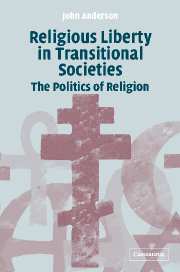Book contents
- Frontmatter
- Contents
- Preface
- 1 Introduction
- 2 Southern Europe: Spain and Greece
- 3 Central and Eastern Europe: Poland and Bulgaria
- 4 The former USSR: Russia and the successor states
- 5 Justifying religious ‘recognition’ and/or discrimination
- 6 Conclusion: culture, conflict, modernisation and religious liberty
- Select bibliography
- Index
4 - The former USSR: Russia and the successor states
Published online by Cambridge University Press: 22 September 2009
- Frontmatter
- Contents
- Preface
- 1 Introduction
- 2 Southern Europe: Spain and Greece
- 3 Central and Eastern Europe: Poland and Bulgaria
- 4 The former USSR: Russia and the successor states
- 5 Justifying religious ‘recognition’ and/or discrimination
- 6 Conclusion: culture, conflict, modernisation and religious liberty
- Select bibliography
- Index
Summary
Our study so far has concentrated on Southern and Central Europe, but it was developments in the field of religion–state relations in the former USSR that initially stimulated this attempt at comparative research. It was in the Soviet Union that there first emerged the communist political system that was to form the basis for the creation of polities of a similar type in various parts of the world. Policies pursued by Moscow often provided an exemplary model for other communist rulers to follow, though many of these states eventually modified them to suit local circumstance. In the field of religion this meant seeking to eliminate religious influences from public life, though different states varied in the extent to which they made this a priority. Even within the fifteen republics that made up the USSR during the post-Stalin years, anti-religious policies were pursued with varying degrees of enthusiasm and success. Under Mikhail Gorbachev the official commitment to the creation of an atheist society was dropped and by the early 1990s nearly all of the newly independent republics had adopted policies and laws that were more favourable to religion and which formally reduced or removed state intervention in religious life. In the case of Russia the legal situation prevailing in the early 1990s allowed for the emergence of a religious free market in which both indigenous religious minorities as well as the far less numerous ‘new religious movements’ could flourish and propagate their teachings.
- Type
- Chapter
- Information
- Religious Liberty in Transitional SocietiesThe Politics of Religion, pp. 115 - 165Publisher: Cambridge University PressPrint publication year: 2003



